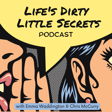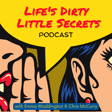
Secret #32: Choicefulness with Dr. Aprilia West
In this episode of 'Life's Dirty Little Secrets,' hosts Chris McCurry and Emma Waddington engage in an insightful conversation with Dr. Aprilia West, a renowned psychologist, executive coach, and author, about the concept of 'choicefulness.' West, with over 20 years of experience working with various individuals and organizations, delves into how our power lies in our moments of choice.
She explains how default reactions can limit our potential and discusses the importance of mindful, intentional decision-making. The conversation covers practical steps for developing choicefulness, recognizing cognitive and emotional biases, and aligning actions with what truly matters to us.
This engaging and enlightening discussion is essential for anyone looking to tap into their full potential and live a more intentional life.
Highlights:
- Defining choicefulness
- Emotional efficacy
- Defaults and behavior patterns
- Values and decision making
- Cognitive biases
- Emotionally driven decisions
About Dr. Aprilia West
Follow @drapriliawest on Instagram
Follow drapriliawest on LinkedIn
Dr. Aprilia West brings 20+ years of real-world experience working with individuals, leaders and organizations across a range of industries, including Fortune 500 companies, U.S. Congress, entertainment industry executives, artists and creatives, and tech founders to increase wellbeing and performance. Her extensive experience as a psychologist, executive coach and trainer gives her a niche understanding of human behavior and how to facilitate positive, prosocial change.
Follow us on Facebook @lifesdirtylittlesecretspodcast and on Instagram @lifesdirtylittlesecrets
Reach out and let us know you are listening and what you would like to hear on the show - email:lifesdirtylittlesecretspodcast@gmail.com

